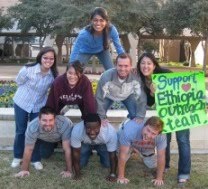from the pen of Nishina
Last week we drove the scenic journey from Addis Ababa to Aleta Wondo. The eight hour trip was pleasant—staring out of the window ain’t so bad when there are kilometers (versus miles) of untouched land to admire. We passed the time by belting out lyrics to a variety of jams, a little Strawberry Wine and Aerosmith’s I Don’t Want to Miss a Thing were top hits for us.
The compound at Common River is breathtaking. There’s a beautiful field just outside of our huts where we can find horses and cows grazing. Yesterday morning I skipped team breakfast (being the rebel that I am) to sit outside and enjoy the scenery; soon afterward I see a heifer and its calf galloping together onto the field…California’s a joke, the happiest cows live in Aleta Wondo, Ethiopia!
We conducted a field survey on Maternal Health in order to get an idea of sex education and healthcare available for the residents living near Common River. I had the opportunity to participate in a health census in my previous medical trip to Nicaragua and I remembered this being my favorite part of medical missions abroad. Essentially, you and a teammate walk from house to house with a translator and ask questions while sitting inside someone else’s home. Clinics do allow us to provide a diagnosis and treatment, but they do not allow for us to actually see a patient’s living conditions or family situation. One of the questions we asked was about female circumcision, also known as female genital mutilation. Female circumcision typically entails cutting of the clitoris and sometime the labia minora. When I first asked this question during our trial run and heard her affirmed response that our interviewee had experienced it for herself, I couldn’t help but think of what a terrible, terrible experience that must have been. The responses overall seemed to be that most mothers were circumcised as children, but the government has made it illegal and girls nowadays do not undergo circumcision. Interestingly, the elderly women felt that the government should not interfere with their traditions since it is part of the culture-- the people should be left to do as they please. I can’t say for certain how women under 60 felt since they may have given biased answers to please us as ferengi (the term they use for foreigners). Those women replied that it was a “different time” in the past. It is difficult to ask such personal questions and probe for their opinions for a multitude of reasons which include having to translate questions and answers through a third party after barging into their daily routine. From what I understand, younger mothers seemed to react positively to the change of no longer circumcising young girls.
The women appear to be well educated about HIV/AIDS and family planning, somewhat a surprise for me given such a rural community. The purpose of the survey was to get an idea of what Common River can offer in terms of education for the surrounding community.
Another high point of the trip was our opportunity to watch the World Cup (taking place in South Africa) match between Ghana and the US in an African equivalent of a dive bar within the small city of Aleta Wondo. Our team was a bit torn since Ghana is the only African team to still be in the running; moreover, one of our very own teammates Joshua grew up in Ghana! Most of us still rooted for the US amongst a crowd of at least one hundred Ethiopians, cramped into a small room with the game projected onto a stone wall. The whole experience was amazing—sipping Ethiopian St. George’s beer and exchanging high fives and hugs with the locals…wouldn’t trade it for the world. Still in awe of the fact that I am here.
Subscribe to:
Post Comments (Atom)

No comments:
Post a Comment